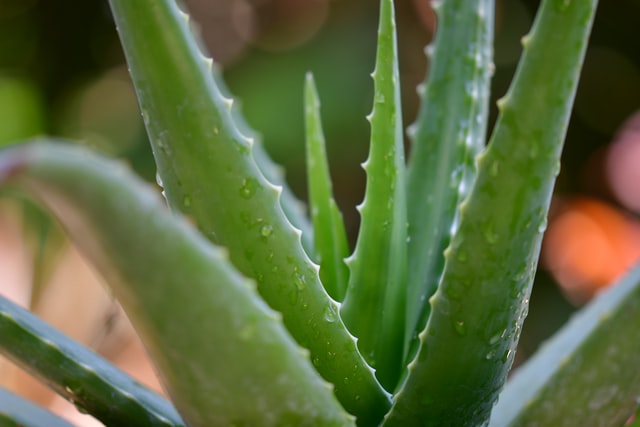Aloe vera is a frost-resistant succulent plant with thick, fleshy leaves. Native to the Arabian peninsula, aloe has been cultivated commercially since at least 1550 AD in India and Pakistan. Early settlers and adventurers brought it to Africa, Europe, North America, Central America, South America and Australia. It’s included in many beauty products as well as dietary supplements because of its emollient properties that soften skin and promote healthy hair growth by moisturizing dry skin cells.Does aloe vera kill scabies are answered.
Photo Source: Wikimedia Commons – Public Domain image by Mike Peel Aloe can be grown outdoors or indoors as a houseplant. The plant should not be kept in direct sunlight, so select a location that provides filtered light and average watering. Aloe plants benefit from a winter dormancy period, so it’s essential to use proper air circulation in your home.
10 Unbelievable Facts About Aloe Vera :
1. Aloe Vera is the Plant That Has Emulated Our Human Skin
Aloe Vera has been used by the Amazon Indians of South America for thousands of years to treat skin conditions. The Moors of North Africa reportedly used aloe vera to battle warts and other skin diseases.
Today, thousands of products are available in stores ranging from cosmetics to cleaning products and pets. Some people even eat aloe mixed in with food or add it as a supplement for better health, although a lot of research has yet to be done on its positive influence on human health.
2. Aloe Vera Helps Reduce Redness & Inflammation
If you’ve ever tried to pop a pimple, then you know how painful skin irritation can be. Aloe is touted as an effective natural treatment for acne. It also soothes inflammation, skin irritation and burns. It has anti-inflammatory properties that help reduce pain and redness of inflamed skin, reducing the appearance of inflammation in the eye.
In addition, topical aloe applied to the sensitive inner eyelid may help prevent blepharitis (puffy eyes). It’s also used as a topical treatment for psoriasis and eczema because its anti-inflammatory effects relieve itching and improve the appearance of redness and scaling in these conditions.
3. Aloe Vera is an Anti-Aging Superstar
As we get older, our skin begins to show signs of aging, including sagging and wrinkles. However, research suggests that topical aloe may reduce the appearance of aging skin by at least 10 years!1 It’s considered a “miracle” ingredient in many anti-aging beauty products because it helps improve the appearance of fine lines and wrinkles. Aloe vera also helps brighten your skin. Consequently, you can use aloe vera as a moisturizer to reduce your risk of dry skin and acne.
4. Aloe Vera Can Help Regulate Body Temperature
If you’re overheated in the summertime or under-heated in the winter, then you’ve probably tried some natural remedies to help regulate your body temperature. Aloe is recommended for this purpose as well because it helps relieve discomfort from heat in the summer and colds in the winter by increasing perspiration. It may also reduce stress levels, which can contribute to swings in body temperature, helping you remain comfortable through those periods.
5. Aloe Vera May Help Reduce Blood Pressure & Cholesterol
Many people use aloe vera as a natural remedy to control high blood pressure. A study found that the extract of aloe vera gel significantly lowered blood pressure in patients with mild hypertension (high blood pressure) or in patients with borderline hypertension (hypertension that is not yet high enough to be considered “high”).
6. Aloe Vera May Reduce the Risk of Infection & Illness
Aloe has been touted as an ingredient for long-term treatment of infection and sickness because it helps reduce the risk of diarrhea and dysentery by reducing intestinal bacteria.4 However, there is little evidence that aloe acts directly on human cells to fight infection. The immune system may play a more important role in aloe’s effect on illness than simply fighting bacterial infections.
7. Aloe Vera May Help Prevent Cataracts
Cataracts are cloudy areas in the lens of the eye, which may develop as we grow older. One study found that topical aloe vera extract (1 percent) over a period of two weeks significantly improved dryness and cloudiness in the lens of the eye in animal models by decreasing protein deposits and reducing inflammatory responses.
8. Aloe Vera May Prevent Premature Aging
A study found that topical aloe vera gel helped improve the appearance of wrinkles and fine lines in the skin of middle-aged volunteers compared to those taken off after 12 weeks.6 While not proven, it’s still exciting news because it could lead to further research on aloe vera’s role in the prevention of aging. Other studies have demonstrated potential benefits of aloe products on skin cells, including increased collagen and elastin production and decreased lipid peroxidation (damage caused by reactive oxygen species).
9. Aloe Vera May Treat Skin Cancer
Certain cancers begin in cells that line organs such as the colon and lungs, while other cancers form in cells in the skin. Both types of cancer start when a cell begins to divide uncontrollably. However, aloe vera gel may slow down the growth and spread of both types of tumors.
10. Aloe Vera May Be More Effective Than Surgery for Various Skin Problems
In a study of patients with skin cancer that had been removed surgically, aloe vera was applied topically three times daily for six weeks after surgery. This treatment caused an increase in the number of healthy and cancerous skin cells in the same area and a decrease in new skin cell growth.







![[pii_email_d3b14d41076369dafc37] Performance Software Solutions 1](https://mszgnews.com/wp-content/uploads/2020/08/Performance-Software-Solutions-1-80x60.jpg)











